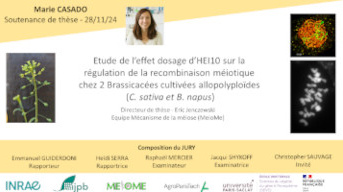Thesis defense: Marie Casado
Studies of HEI10 dosage effect on the regulation of meiotic recombination in 2 Brassicaceae allopolyploid crops (C. sativa and B. napus)
Meiotic regulation is an essential process not only for maintaining fertility, but also for creating diversity through the generation of new allelic combinations via cross-overs (CO). Recently, more and more evidence has emerged in support of the importance of meiotic protein dosage in the regulation of CO formation. With this in mind, during my thesis, I studied the effect of meiotic protein HEI10 dosage on CO formation in 2 allopolyploid Brassicaceae: rapeseed and camelina, with carry 5 and 3 copies of HEI10 respectively. I was thus able to show that HEI10 is essential for the formation of class I CO in camelina, and to confirm its dosage effect. Unexpected results were shown for low doses of HEI10, emphasizing the contribution of polyploid species for such studies. I also worked on the generation of haploid-inducing lines, useful tools for the study of homoeologous recombination, in these 2 species by generating dmp mutated lines.
Director: Eric Jenczewski - INRAE, IJPB, Versailles, MeioMe team
Members of the jury
> Emmanuel Guiderdoni (Rapporteur) – CIRAD, AGAP, Montpellier
> Heïdi Serra (Rapportrice) - CNRS, iGReD, Clermont-Ferrand
> Raphaël Mercier (Examinateur) - Max Planck Institute, Chromosome Biology, Cologne, Allemagne
> Jacqui Shykoff (Examinatrice) - CNRS, IDEEV, Gif-sur-Yvette
> Christopher Sauvage (Invité) - Syngenta, Toulouse
To attend, contact Eric Jenczewsk
Research developed at the Institute Jean-Pierre Bourgin for Plant Sciences.
Back
